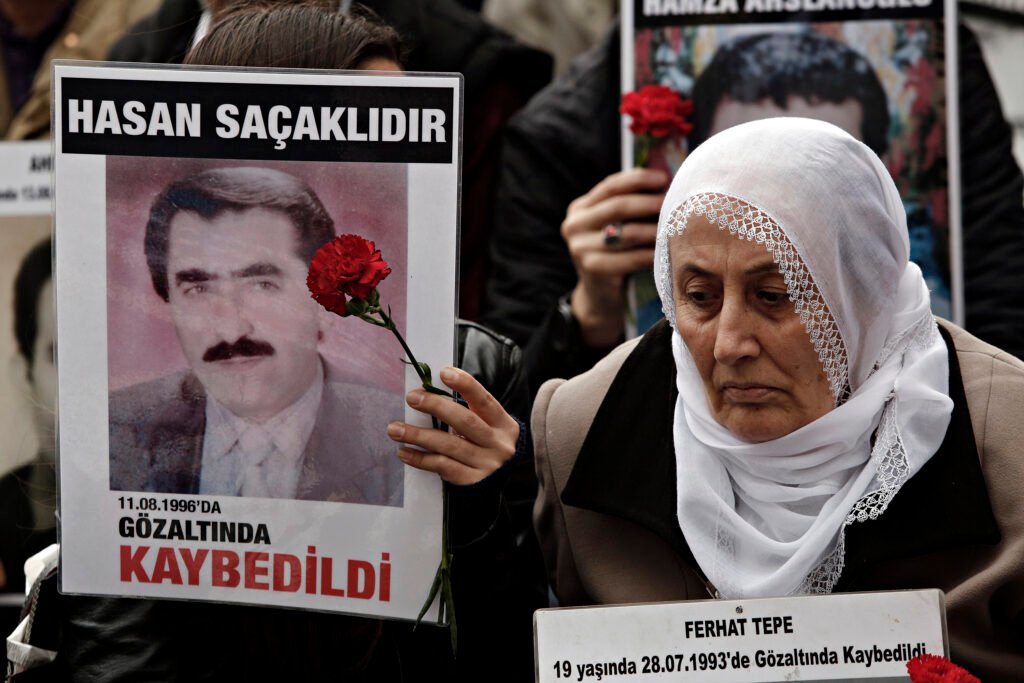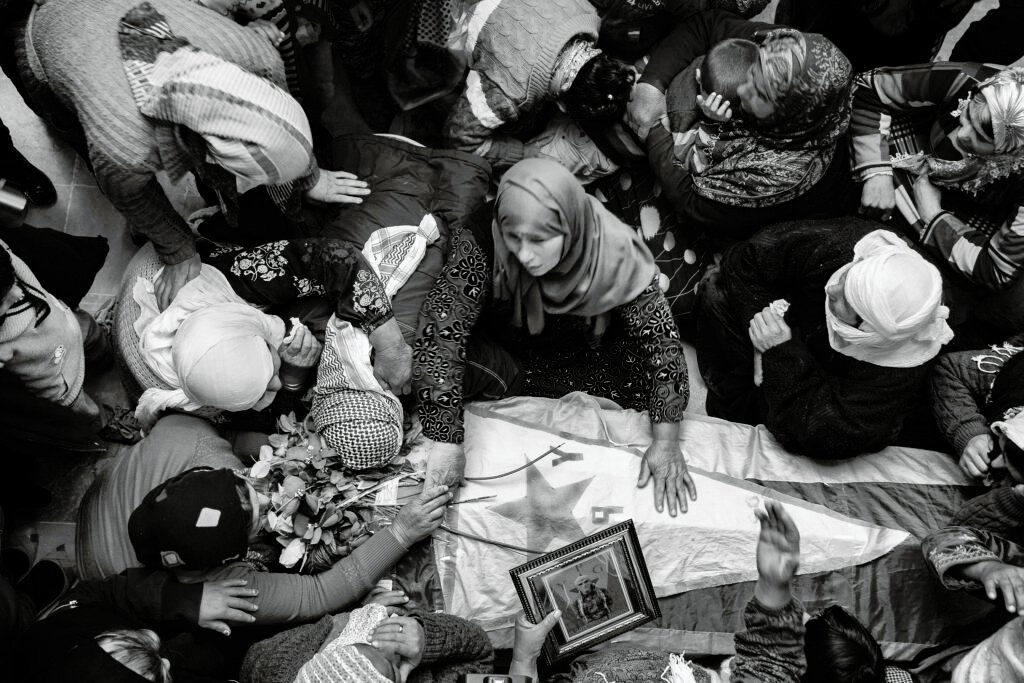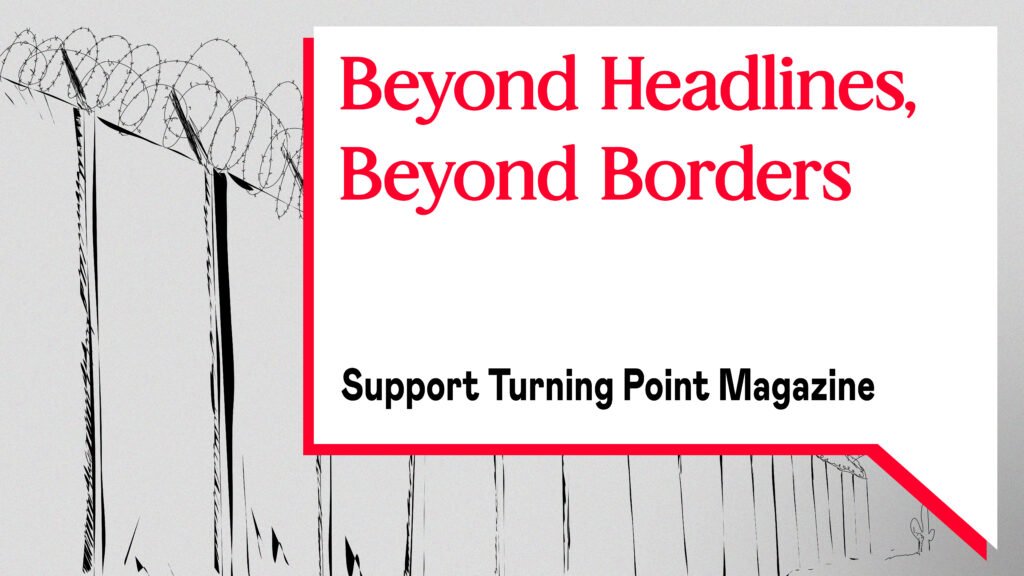Cover photo: People observe one of the Mothers of Plaza de Mayo inside the van that takes them to attend the mobilization commemorating 40 years of democracy in the Argentine Republic on March 24, 2016. © Gianni Bulacio
All over the world, maternal love is a universal feeling that unites people in the fight against repressive regimes.
The Argentinian military junta, which took power in a military coup in 1976, pursued a policy of terror against all dissent. In power for almost a decade, the junta killed almost 30,000 people while arresting and torturing many more. Disappeared people were held by the regime in secret prisons. And the women who gave birth in them were separated from their children and adopted by military supporting families. Approximately 500 children lost all contact with their real families.
The authorities brutally suppressed any attempts to mention these atrocities leaving people afraid to even think about protesting. In this seemingly hopeless situation, the mothers and grandmothers of the repressed found a loophole to voice their demands for the return of their abducted relatives and to clarify the fate of the missing.
Although the police prohibited women from holding rallies in the main square of the Argentine capital, Buenos Aires, women came up with a clever tactic to continue their resistance. Slowly walking in a circle around the May Pyramid (the central monument of the square), so as to not form groups larger than three, they walked in pairs, holding hands. To distinguish each other, women came up with the idea of wearing white scarves made from a child’s sheet and gathering every Thursday on the Plaza de Mayo. They began to call themselves the Grandmothers of Plaza de Mayo.
Over time, the regular and persistent actions of the mothers received a robust international response and attracted the attention of the world community to the Argentine problem. The world’s response was significant in pressuring a search for the missing people. The mothers and grandmothers of May Square managed to force the authorities to admit to the kidnapping. Grandmothers of Plaza de Mayo began searching for their grandchildren in 1983, when the constitutional government was restored.
Inspired by the example of the Grandmothers of Plaza de Mayo, mothers in Turkey began holding a peaceful weekly vigil in Istanbul’s Galatasaray Square in 1995 to protest the forced disappearance of their loved ones and demand justice. The Saturday Mothers movement is the most prolonged peaceful protest in Turkey; it symbolizes the illegal restrictions placed on exercising the right to peaceful assembly in the country.

Mothers around the world do not give up and continue to fight for their children and, at the same time, for the world. The struggle of desperate mothers has stopped wars. For example, one of the most influential anti-war movements in Israel from 1997 to 2000 was the Four Mothers movement, organized by women who persistently demanded the withdrawal of the Israeli army from Lebanon, with or without a peace agreement, and the return of their children alive. The movement was accused of undermining the morale of Israeli society and the army. Despite the public accusations, the women did not give up and continued to advocate through nonviolent action to solve their problems.
Thus, the example of the mothers of the past was followed by the mothers and wives of those who were mobilized in response to the monstrous and devastating war in Ukraine by Russia’s Putin regime.
“When my son left, I finally understood what kind of hell the authorities had dragged us into,” said Elena, a 65-year-old food service worker from a small provincial town in the Ural Mountains of Russia. The woman is acutely aware that anything she says could fall into the hands of the authorities and be used against her (for her protection, Elena is identified only with her first name).
Her son Evgeniy was drafted a month after Putin announced mobilization on September 21, 2022. Since then, her son has not had a single day of vacation, even though he was seriously injured twice in the leg and chest.
Never before had Elena been interested in politics. She admitted that at first she didn’t even notice the start of the war in Ukraine: “On all TV channels and in all the newspapers, they tell us that this is not a war, but a special military operation. So half the country lives in ignorance, and the other half, like us now, is in hell.” The authorities still refer to the war as a special operation, and people are still being arrested for using the word war in relation to Russian atrocities in Ukraine.
After her son’s mobilization, Elena turned to Telegram and became one of the most active commentators on anti-war chats. She sharply criticized the authorities and demanded that the war be stopped immediately. It turned out that there are a lot of women who are trying to return either their sons, husbands, relatives, or friends. Elena was particularly active in one telegram chat, “The Way Home,” created by the mothers and wives of the mobilized. Indeed, in Russia now, even for using the word “war,” you can get an actual prison sentence. Absolutely any anti-war statement or repost on social networks fits the charge of “discrediting the Russian Army.”
Elena said that she is not afraid for herself: “My son is almost disabled; he urgently needs surgery. If they take me to prison, who will look after him when he returns? We don’t have anyone else. His father left me while I was still pregnant, and I raised him myself.”
After Russia began its full-scale invasion of Ukraine, Russians faced even more brutal repression. A large number of opposition members left the country in fear, and those who remained were frightened by arrests and torture. Nevertheless, from the beginning of last year, Elena began writing appeals to the authorities, including the presidential administration, and protesting along with other mothers and wives of drafted soldiers.
The protest activities of mothers and wives are unlikely to impress spectacle-goers. There are no clashes with the police, no chanting of slogans. Women lay flowers weekly at the Great Patriotic War monument (how Russians refer to the Eastern Front during WWII) in Moscow and other cities. To distinguish each other, relatives of the mobilized wear white headscarves. Their last protest action was timed on the 500th day since the mobilization announcement. This action, on February 3 in the very center of the Putin regime—near the walls of the Kremlin at the monument to the Eternal Flame—was supported by opposition politicians in exile, who dubbed the women protesting “enemies of Putin.” Although the police did not detain any women, they intimidated them, for example, by arranging surveillance of protest participants and deliberately pushing them during arrests at protest rallies.
Elena said that at the last “all-Russian” action on Red Square, in addition to the protesters and journalists who were subsequently detained, there were several people who walked around and filmed women closely. Elena suspects that they are members of the so-called Center E (Center for Combating Extremism), an independent structural unit of the central apparatus of the Ministry of Internal Affairs of the Russian Federation; allegedly created to combat extremism and, in fact, to search for and punish all those who disagree with the regime.
The “Way Home” chat also published other stories about security forces’ pressure on women: women are under surveillance, the police come to their homes to interrogate them about participation in unauthorized protests, journalists and men who came to support the women’s protests are emphatically detained.
Protesting mothers and wives are now the only mass-organized movement making anti-war demands in Putin’s Russia. They demand the immediate repeal of the mobilization law, which is still in effect, and the return of those previously mobilized home.
“The authorities simply don’t know what to do with us. They understand that it is impossible to stop women in despair,” explained Elena. Protesting mothers and wives are now the only mass-organized movement making anti-war demands in Putin’s Russia. They demand the immediate repeal of the mobilization law, which is still in effect, and the return of those previously mobilized home. The mobilization is described as “partial” and primarily affects people with military experience, but numerous cases of indiscriminate mobilization have been recorded. In addition, women say that they are fighting for the return even of mercenaries whose contracts have expired. Elena hopes there will be no one to fight and the war will finally end.
The Way Home has more and more subscribers. Now, their channel has more than 70 thousand subscribers. Women’s rallies gather people who are not relatives of those mobilized. “We were united by personal tragedy. It turned out that our pain is shared by many of our fellow citizens,” said Elena.
Thousands of kilometers away, in another country where Russian and Turkish troops are bombing civilians, the mothers’ struggle takes on a different form. In Syria, women are sometimes forced to go to war to save their loved ones. The armed struggle of women against ISIS in northeastern Syria, in a region called Rojava, has become known to the whole world. But in addition to participating in the war, women have to face the heavy burden of fighting the mentality of a patriarchal society.
“I had to leave my children at home and protect my people,” Sose recalled at the outbreak of the revolution in 2012 in Rojava and the subsequent civil war in Syria. Sose is over 50 years old, and even at home, she wears a military uniform.
Her house is always full of guests. Sose’s son Masis, a shy but constantly smiling, chubby ten-year-old, poured tea. As he poured the tea, Sose explained: “I teach my sons how to manage the house, too. Because this is not only the responsibility of women.”
The Kurdish Self-Defense Forces declared a revolution in 2012. New structures of revolutionary self-government began to emerge in the region. Women began to develop their own autonomous organizations in both the civilian and military spheres. At the same time, the war on ISIS was raging in the region.

When women’s armed groups were created, Sose wanted to join them and fight against ISIS and factions of the Free Syrian Army and Islamist militias like the al-Nusra Front and Jabhat Ghuraba al-Sham. But in the conservative society of the region, Sose had only one choice: continue to be an obedient wife and stay at home with the children. By the beginning of the war, she already had four children (three daughters, two of them twins, and a son). The whole family, including her husband, was against her participating in the fight, especially at the front. But Sose was adamant: “From the very beginning of the revolution, I participated in the organization of society. When my friends began to die in battles with ISIS, I realized I could not stay at home. My comrades are also my family.”
Sose went to the front. At first, her husband Joseph opposed his wife’s decision—resulting in him taking the children and leaving. Yet, more and more women took up arms and stood up to defend their homeland. Soon, society began to increasingly treat military women with respect; Sose’s husband casted aside all his prejudices, returned, and became proud of his wife. The children knew their mother was at the front. They were waiting for her, and, of course, they were worried. But their mother, Sose, always returned home.
The last time she was in combat was in 2019 when Turkey and its proxy forces occupied Serekaniye, a city on the border with Turkey. This time, as Sose comments: “Nobody wanted to let me into Serekaniye. The commanders told me I was a mother and should consider my children. But I asked permission from the YPJ commander (Women’s Self-defense Units) to be allowed to join the fight. She has known me for a long time, she has seen me in battle,” Sose recalled.
The commander allowed Sose to take part in the defense of Serekaniye. She was lucky to get out of the building, which was abruptly hit by a shell. All of her YPJ comrades were inside and died. She retrieved their bodies and left Serekaniye with a wounded friend.
In the past ten years, while at war, Sose had four other children. Sose’s eldest daughters are now 22 years old. They both joined women’s self-defense units after coming of age. “We are proud of our mother, and she is an example for us,” said daughter Sose Talin.
Most often, however, the situation is the opposite, and the mothers are the ones that have to say goodbye to their sons and daughters. Barin, a Kurdish woman from Izmir, Turkey, is one of them. Since 2014, she has not seen her son Farhad after he decided to defend the Kurdish city of Kobanе from ISIS militants.
“I knew he would grow up to be a fighter for justice and freedom. I raised him this way. Once, when he was little, a neighbor boy beat him up, calling him a terrorist. In Turkey, it is believed that if you are a Kurd, then you are a terrorist,” explained Barin. “Then I told my son that he should be proud of who he is.” By the age of 60, Barin had already undergone heart surgery, which did not stop her from smoking. According to her, she cannot stop smoking because she is constantly nervous.
A few years after her son Farhad left, Turkish intelligence put him on the terrorist list. Since then, the police began to harass Barin regularly. One day the police stormed into her home after she had heart surgery and the officers claimed her son was dead.
“Although they wanted me to cry, I didn’t shed a tear in front of them,” said Barin. “Just the day before, I read the news about how the parents of a Kurdish guerrilla were given their son’s body in a plastic bag. I was terrified, but I didn’t show it. I just began to wait and believe that he would write. A mother’s heart doesn’t lie.”
War and military service are significant obstacles to regular communication between families and their loved ones. It is the case for all armies in the world and during all wars. Barin is behind enemy lines, and every contact with his son can be dangerous for him and her.
“One day, he [Farhad] called me in the middle of the war in Afrin. He had such a calm, reasonable voice; he even tried to discuss everyday trifles with me. Later, I found out that he was right at the front, and a drone was flying above him. He probably knew that he could die and decided to say goodbye,” Barin recalled. That time, everything worked out, and Farhad survived. However, there has been no contact with him again for almost three years. Barin receives new messages from the police demanding to call her son home, and Rojava, the region in which her son now lives, is constantly under attack from Turkey.
Lisa Shishko
Independent journalist and researcher covering the topics of decolonial practices and wars in the Middle East, Russia and the Caucasus.




